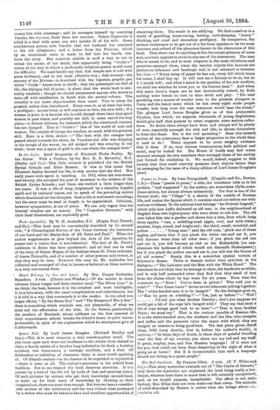Queen Slab. By Lord James Douglas. (Richard Bentley and Son.)—This
is in most respects a very common-place novel. The plot turns upon such worn-oat incidents as the return from abroad to claim a family estate of a brother long believed to be dead, a hunting accident, two horse-races, a carriage accident, and a duel. Of delineation or unfolding of character there is none worth speaking of. Of didactic matter—be its absence to be regretted or rejoiced at —there is none at all. The author's grammar is far indeed from faultless. But in one respect the book deserves attention. It is a picture by a lord of the life led by lords of fast and sporting tastes. Of each pictures by writers who get their knowledge second-hand, or make up for their want of knowledge by drawing on their imaginations, there are more than enough. But here we have a consider. able section of the aristocracy and the very richest class portrayed by a writer who must be taken to have had excellent opportunities of observing them. The result is not edifying. We find ourselves in a world of gambling, horse-racing, betting, card-sharping, "heavy" drinking, and cruel and shameless profligacy. By comparison, the animal exuberance to be got out of a fox-bunt appears to be the most innocent and refined of the pleasures known to the characters of this book. That there can be anything to live for except pleasure of some sort, nowhere appears to occur to any one of the characters. The man who is meant to be, and in most respects is, the most chivalrous and generous amongst them, when the heroine rejects him because she prefers an infamous and bankrupt earl, is not ashamed to threaten her thus :—" Every scrap of paper he has out, every bill which bears his name, I shall buy up. It will cost me a fortune to do so, but do it I surely will ; and when I stand in the position of his sole creditor, we shall see whether he loves you or his fortune best." And when this same lover's hopes are at last irretrievably ruined, he finds nothing more heroic to tarn to than drink and play. " His mad gambling was a source of wonder even to the greatest plungers in Paris, and the heavy sums which he lost every night made people wonder how long even his vast resources would bear the strain." The glimpse Lord James Douglas gives us of this aristocratic Elysium, into which, we suppose, thousands of young Englishmen would give half they possess to enter, suggests some serious reflec- tions. No doubt there always have been and always will be plenty of men, especially amongst the rich and idle, to devote themselves to lives like these. But is the evil spreading ? Does this tainted. section of the aristocracy bear a larger proportion to the whole than it used to do ? There appears to be some weighty evidence that it does. If so, very serious consequences, both political and social, may be looked for. The House of Lords may find worse enemies amongst its own members than amongst those of the society just formed for abolishing it. We would, indeed, suggest to this society that they could scarcely promote their objects better than by arranging for the issue of a cheap edition of Lord James Douglas's novel.


































 Previous page
Previous page